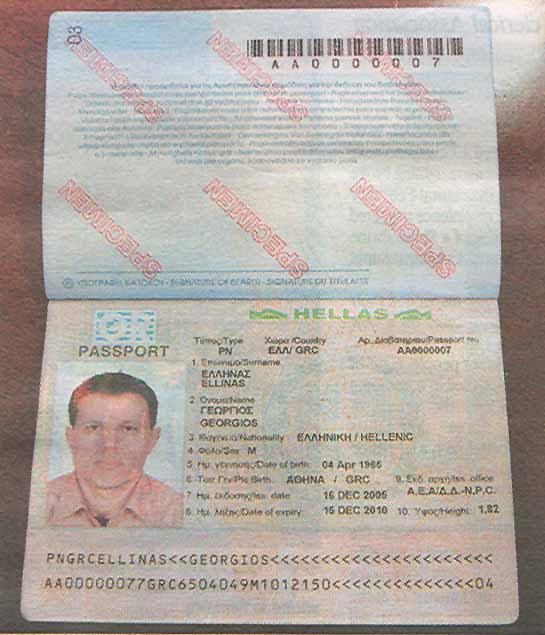 |
||
|
Shut Your Mouth, Please Athens News |
||
All new passport photos must be of an unsmiling face with its jowl shut or else authorities will reject the application for failing to meet the new rules introduced in January to cbmbat fraud By Kathy Tzilivakis |
||
| Talk about turbulence. Officially, Greece's new hi-tech passports took off in January but complicated photo regulations made it difficult for them to get off the ground. Officials processing the passport applications in downtown Athens, Kallithea, Pangrati and Egaleo told this newspaper last week that the situation has greatly improved. Several hundred applications were rejected last month at these four centres because the photo did not meet specification. Only 50,000 passports have been printed at an ultramodern facility managed by the police since the start of this year, according to the public order ministry. The multimillion-euro technology, however, can mass-produce as many as 60,000 passports a day. It was purchased from TOPPAN, a Japanese company. The same printing technology is currently being used for passport production in countries like the United States, Canada and New Zealand. The new passports contain a biometric chip that holds a digitised photo and signature to prevent counterfeiting. Photographs on new passports are now digitised onto the page, making them more difficult to tamper with. |
  This Multimillion-euro Japanese technology can mass- produce as many as 60,000 passports a day. However, only some 50,000 passports have been printed since January |
|
|
No longer issued by local prefectures, the new passports are being mass-produced at a new hi-security central office in the eastern Athens suburb of Kessariani (8 Hiou St).
The old Greek passports are very easy to forge. Fakes sell for several thousand euros on the black market. More than 2,000 counterfeit passports were confiscated last year. The new passports contain the following personal details (in Greek and Latin characters) of the holder: last name, given name, maiden name, nationality, date and place of birth, sex and height. The passport will also state the date it was issued. Passport FAQs My 'old-type' Greek passport expires in 2008. Is it still valid? Yes, but only until the end of this year. Only the new biometric passports will be accepted as of 1 January 2007. Where can I apply for a new passport? The public order ministry has set up application centres at 99 police stations across the country. To find the nearest one, ring the OTE directory information 11888. There are also 151 application centres being set up at Greek consulates around the world. What are the application requirements? There are five application requirements: 1) Application form (available at all application centres) 2) A recent digitised photograph 3) A photocopy of both sides of your Greek identification card 4) A statutory declaration (ypefthini dilosi) stating whether you have ever been convicted of forgery or making a false statement regarding the issuing of a passport and whether you are currently facing criminal charges. The statutory declaration must also indicate whether you have evaded the mandatory draft (for adult males) and whether the courts have denied you the right to leave the country 5) A receipt of payment for the following fees: 26.40 euros for a standard passport valid for five years and an additional 25 euros for the passport booklet. These fees are paid at the tax office or at a Citizens' Service Centre (KEP) Can I use any passport-size photograph? No. The photograph (taken by a commercial photographer) has to meet several specifications. For instance, it must have been taken within the last 12 months. The size of the photo must be 40mm wide and 60mm long and must be printed on high-quality photographic paper. Photos must be taken with uniform lighting so as not to show shadows or backgrounds. Photos must show the full front view of the face, centred in the photo and squared to the camera. Eyes must be open and clearly visible. Glasses may be worn, but the eyes must be visible. Sunglasses are not acceptable. Hats are not permitted. Religious head coverings may be worn, provided that the full facial features are clearly visible. Facial expression must be neutral (no smiling or frowning) with the mouth closed. Red eyes are not acceptable. When are the passport issuing centres open? These centres (99 in total) are open weekday mornings and evenings, as well as weekend mornings. The centres will remain closed on national holidays. Can I send someone else to submit my application for me? No. The applicant must submit his/her application in person. Can I submit my application at one of the Citizens' Service Centres (KEPs)? Note: The United States last year had announced a 26 October 2005 start date for mandatory biometric passports for all non-visa travellers. EU Justice and Home Affairs Commissioner Franco Frattini, however, requested an extension to 28 August 2006. In June, the US agreed to extend the biometric deadline until 26 October 2006. |
||
(Posted on 17 March 2006) HCS readers can view other excellent articles by the Athens News writers and staff in many sections of our extensive, permanent archives, especially our News & Issues, Travel in Greece, Business, and Food, Recipes & Garden sections at the URL http://www.helleniccomserve.com./contents.html
All articles of Athens News appearing on HCS have been reprinted with permission. |
||
|
||
|
|
||
|
2000 © Hellenic Communication Service, L.L.C. All Rights Reserved. http://www.HellenicComServe.com |
||

